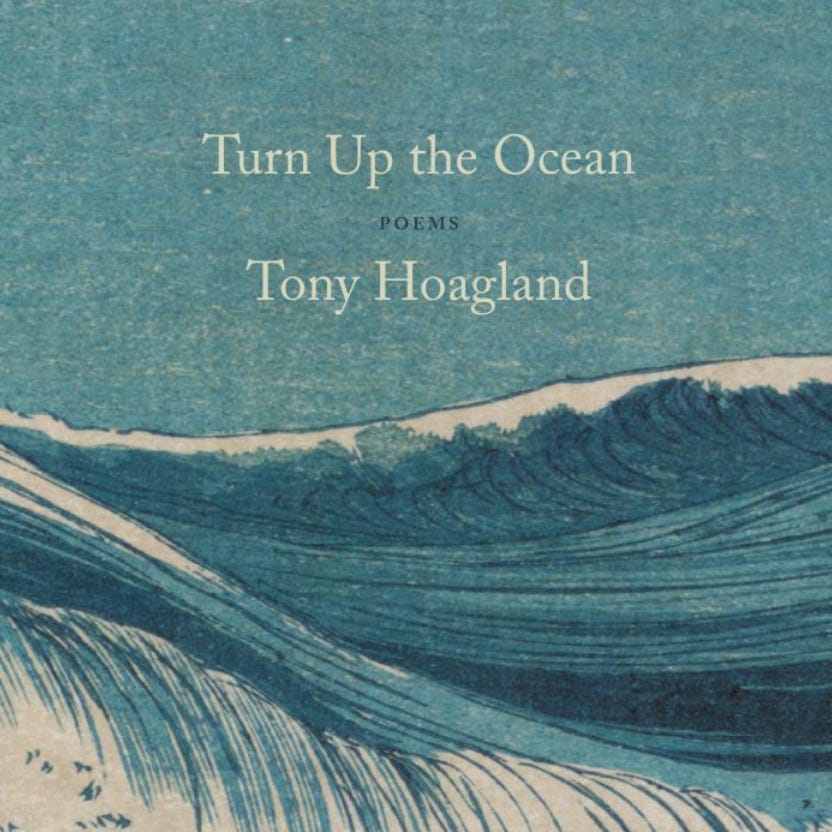Book Review: "Turn Up The Ocean" by Tony Hoagland
Facing the Final Tide.
Book: Turn Up the Ocean
Author: Tony Hoagland
Publication Date: 2022
Publisher: Graywolf Press
Where To Buy: Goodreads
Tony Hoagland, in Turn Up the Ocean, his final collection of poetry, leaves us his clear-eyed reflections on how he lived, often with a blended hopeful-regretful tone.
The book follows a natural emotional progression that someone diagnosed with a terminal illness might follow: denial and deflection (e.g., humor and fantasy), anger (e.g., refusing prayers or help), regret, reckoning, and attempts at hope.
He is rarely the hero of his own poems. And if a poem needs a brave protagonist, it’s not him — even if that protagonist might be based on him.
Multiplicity of the Self
Throughout the collection, a subtle recurring theme emerges of the splitting self — but not in a rending, tearing kind of way; rather, a calm recognition of the multiplicity of selves.
We see this in the image of a patient holding his own hand.
We see it in him already waiting for himself to arrive.
We see it in a boat straining against, then relaxing into, its tethers.
Another theme arises: what we might know on a subconscious level but are unwilling to say out loud.
For example, in “Siberia”:
that life and death stuff
of which everyone knows
but people don’t like to speak.
Facing the Abyss
In this collection, I rarely felt like he was ending the poem by leaving the reader on the edge of the abyss.
Perhaps that’s where he didn’t want to leave himself, given that he was already facing that ultimate abyss.
The wistfulness of poetry can get exhausting, and it can become intolerable when the poet is actually writing about death.
Hoagland can’t save himself — but he can save us, the readers of his poetry, from excessive poignancy.
Thinking on the Page
Hoagland lets us in on the workings of his mind. He lets us see him thinking on the page.
His imagination rarely seems bridled, and the result is a delightful, digressive rambling. But you know that he’s getting to a good point or image, so you stick with it.
He keeps us close by using everyday language, recognizable artifacts of our world.
The meandering is so engaging that you almost don’t recognize the “turns” that he makes. And by “turn,” I mean that he gets to the generated subject of the poem — the heat of the poem.
Though he can make a lot of scene changes in a poem (e.g., “Success”), or meanders, he only makes one or two turns per poem — which means that each turn has more weight.
While you’re in the middle of the poem, you might not know where Hoagland is going. But by the end, you know that the poem knew where it was going all along.
Simplicity and Syntax
There are things Hoagland does syntactically that feel almost unpolished or simplistic — but have the desired effect.
For example, in “Diagnosis”, the second and third-to-last stanzas repeat “And he says” at the beginning of a line four times, creating a kind of tension that releases in the last stanza:
And he says, “Why don’t they just go?”
And he says, “Because you are standing in their way.”
And he says, “But I don’t see them.”
And he says, “Yes, your diagnosis is the same
as it has always been:They are here and you don’t see them.
But they see you.”
At the beginning of the book, he’s using fairly traditional sentence structure — not the sort of thing we expect to see in poetry.
But as the book goes on, he deploys longer and longer sentences, makes more use of colons and semicolons.
We start slowing down, seeing the lacunae where the mysteries live.
And this matches the more reflective tone the collection takes on as it progresses toward its end — toward Hoagland’s end.
The Inkwell is published by Ink & Ribbon Press — a nonprofit poetry publisher dedicated to craft, discovery, and the permanence of the printed word.




Tony Hoagland. One of my very favorite poets.